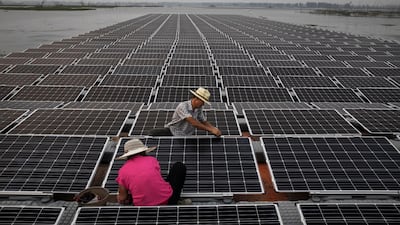A unit of China Three Gorges is building a 1 billion yuan (US$151 million) floating solar power plant, the world’s biggest, in the nation’s eastern province of Anhui.
China Three Gorges New Energy started building the 150-megawatt project in July and part of the plant has connected to the grid, according to a December 10 statement. The project features panels fixed to floats on the surface of a lake that formed after a coal mine collapsed, according to the unit. The entire facility is expected to come online by May 2018.
____________
Read more:
Concentrated solar power projects to accelerate in the Mena region: BMI report
Middle East a global leader in renewables and soon electric vehicles
____________
Floating solar is getting bigger in China, where ground-mounted projects aren’t used to full capacity because of grid congestion. About 5.6 per cent of solar power generation was idled in the first three quarters, according to data from the National Energy Administration.
Before construction of China Three Gorges’ plant, China’s biggest commissioned floating solar project was a 40-megawatt farm by Sungrow Power Supply Co. in the same province, according to Bloomberg New Energy Finance.

